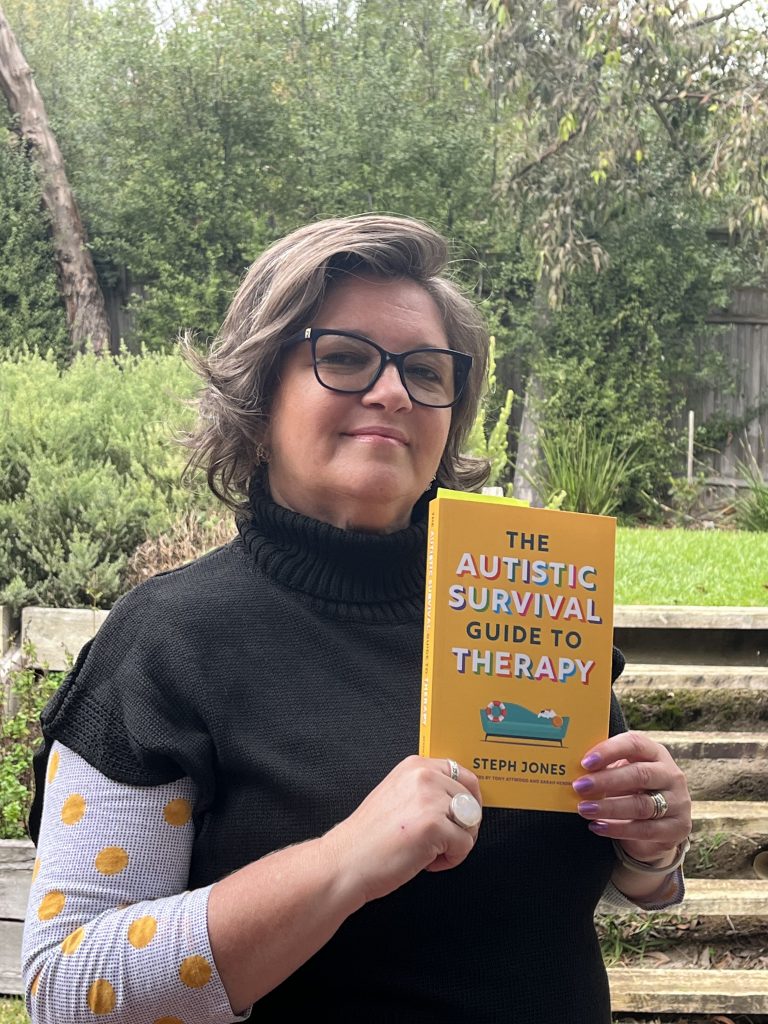CONTRIBUTOR “The Autistic Survival Guide to Therapy” by Steph Jones

I’ve been following Steph Jones’ journey as the ‘autistic_therapist’ (Instagram handle) since 2021 and found myself relating more and more to her content and lived experience. I commented on posts from time to time until one day Steph put out a call for contributors for her new book, based on any negative or deficit based autistic experiences in therapy, and how they might require a different approach from neuro normative practice.
I could certainly relate to this as a mother of neurodivergent children and noted that my own journey to becoming a neuro affirming art therapist, was born from these incredibly overwhelming, traumatic and potentially damaging experiences. I felt them jarring and often full of blame, coupled with similar often ableist recommendations and comments from schools, ‘well meaning’ others and general societal norms. I knew there had to be a better way and I feel Steph has articulated this perfectly in her book ‘The Autistic Survival Guide to Therapy’ (Oct 19 2023, Jessica Kingsley Publishers) offering the pro’s and con’s of a variety of therapeutic options for the neurodivergent experience as well as the benefit of lived experience.
Now thanks to Steph I comfortably use my lived experience relationally with clients (when transparency is relevant) and provide support to parents and carers along their child’s life span, communicating with schools where necessary and providing psychoeducation and collaborative sessions with families as well.
I feel honoured to have been included in the book with my own insights and experience in creative therapies. Thank you Steph Jones for this wonderful light, realistic and informative and incredibly important resource – dusted with humour, dot points, breakouts and easy access for ND brains.
Excerpt from ‘The Autistic Survival Guide to Therapy’ (Oct 19 2023, Jessica Kingsley Publishers. pp.197-199; 211)
‘CREATIVE THERAPIES. There’s a growing body of evidence to suggest that creative arts and expressive therapies (things like music, art, dance, acting, even comedy) might be beneficial to autistic people, allowing us to access feelings without questioning the legitimacy of them (no, Saul Goodman, not today!) and without needing to process them via thoughts in a way which might prove really difficult (pp.197-198).’
Professor Tony Attwood adds ‘If we are going to use therapy in its broadest sense we need to start looking at arts and music.’
‘Neurodivergent art therapist Louise Weston agrees sharing: I feel that art therapy itself is often seen as unconventional yet still works within evidence-based frameworks. I personally use whichever methods are suited to best cater to my client relationally and take it at their pace. Oftentimes my clients have tried other modalities and find different results through art making. Or they are seeking to balance out other therapies and use the materials to help regulate, release, restore, reframe, repair, or reset – often with very little said – yet still communicated. I call upon breathing, movement, sights, sounds and smells to compliment my practice as well. Working somatically gives an opportunity to teach my clients to become attuned to their needs through signals in their bodies and recognise triggers or warning signs, prior to reaching the point of meltdown (pp.198-199).
Additionally: ‘SO DOES NEUROTYPICAL THERAPY WORK FOR NEURODIVERGENT BRAINS?. We have tried many in our family before I found a neurodivergent therapist which has been the most successful and life changing to be honest. I think it’s down to the person providing the service though and their understanding of neurodivergence. I know that my clients have expressed that my lived experience of being a neurodivergent family has benefitted their therapeutic experience as well as helping their parents or carers gain greater insights about their children (pp. 211)
A must read. Click for more info